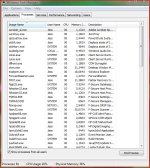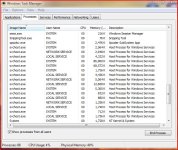Uncheck
Show processes from all users and you won't be seeing so much processes

Glad I could help. We will delete all used tools and I'll give you some tips to harden your security and learn how to protect yourself

Recommended reading:
MUST READ - security tips:
MUST READ - general maintenance:
The Importance of Software Updating:
In order to stay protected it is very important that you regularly update all of your software. Cybercriminals depend on the apathy of users around software updates to keep their malicious endeavor running.
Operating systems, such as Windows, and applications, such as Adobe Reader or JAVA, are used by tens of millions of computers and devices around the world, making them a huge target for cybercriminals. Downloading updates and installing them can sometimes be tedious, but the advantages you get from the updates are certainly worth it.
Recommended additional software:
TFC - to clean unneeded temporary files.
Malwarebytes' Anti-Malware - to scan your system from time to time in search for malware.
Malwarebytes' Anti-Exploit - to prevent plenty of mostly exploited vulnerabilities.
McShield - to prevent infections spread by removable media.
Unchecky - to prevent from installing additional foistware, implemented in legitimate installations.
FiheHippo.com Update Checker - to keep your programs up-to-date.
Adblock - to surf the web without annoying ads!
Post-cleanup procedures:
Download
DelFix by Xplode and save it to your desktop.
- Run the tool by right click on the icon and Run as administrator option.
- Make sure that these ones are checked:
- Remove disinfection tools
- Purge system restore
- Reset system settings
- Push Run and wait until the tool completes his work.
- All tools we used should be gone. Tool will create an report for you (C:\DelFix.txt)
The tool will also record healthy state of registry and make a backup using ERUNT program in %windir%\ERUNT\DelFix
Tool deletes old system restore points and create a fresh system restore point after cleaning.
My help is free for everybody.
If you're happy with the help provided and/or wish to buy me a beer for the assistance you received, then you can consider a donation:

Thank you!
Stay safe,
TwinHeadedEagle


 Run as Administrator to start the tool.
Run as Administrator to start the tool.



